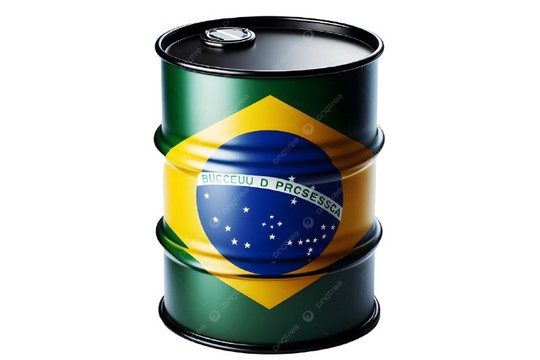The Brazilian oil industry is facing a period of uncertainty after shipments to the US were suspended following President Donald Trump’s announcement of a 50% tariff on Brazilian exports, reported Reuters, citing sources.
President Donald Trump has threatened 50% tariffs on Brazilian imports, specifically targeting crude oil, which is Brazil’s top export to the United States.
Analysts suggest that while these tariffs could create short-term disruptions, Brazil’s state-controlled oil company Petrobras is in a position to redirect its oil exports to other countries with limited long-term impact.
The Brazilian Petroleum Institute has expressed concern over the tariff threats, while Petrobras is already facing internal pressures from lower oil prices and is revising its strategic plan to focus on cost reduction.
Brazil has become the latest target of U.S. President Donald Trump’s ire after the Republican frontrunner threatened 50% tariffs on the South American giant for allegedly persecuting right-wing ex-president Jair Bolsonaro. In a post on Truth Social, Trump called on Brazilian President Luiz Inácio Lula da Silva to halt what he described as a “Witch Hunt that should end IMMEDIATELY!” Bolsonaro is currently on trial for allegedly attempting to overturn the results of the 2022 election.
Tensions have escalated. Lula has promised retaliation if the U.S. moves forward with the punitive tariffs, telling local outlet Record, “If he charges us 50%, we’ll charge him 50%.” But with Brazil’s oil exports to the U.S. on the line, Lula will likely be hoping for a less volatile resolution.
Crude oil is Brazil’s top export to the United States, valued at $5.83 billion in 2024, according to official trade data. It has so far been exempt from the 10% baseline tariffs Trump proposed in April on most foreign imports. Last year, Brazil exported an average of 1.78 million barrels per day (bpd) of crude globally, with approximately 243,000 bpd shipped to the U.S., per ANP and EIA data.
The Brazilian Petroleum Institute (IBP) says it views Trump’s threats with “concern” and has urged the Lula administration to seek a diplomatic solution.
Steep tariffs on oil could further skew the trade balance between the two countries. In 2024, Brazil ran a $6.8 billion trade deficit with the U.S.—one of the few nations that buys more from the U.S. than it sells to it. Top U.S. exports to Brazil include fuels, aircraft, machinery, and electronics.
Brazilian Petroleum and Gas Institute (IBP) president Roberto Ardenghy was quoted as saying: “Business involving cargo that has to leave Brazil for the US is suspended.”
The IBP represents major oil companies in Brazil including Petrobras, Shell, TotalEnergies, ExxonMobil and Equinor.
The industry is now considering redirecting shipments to Europe and India, but for the moment, operations are on hold until the situation becomes clearer.
Considering the impending tariffs, companies have opted to store oil on floating production vessels or cargo ships instead of proceeding with exports to the US.
Ardenghy noted that due to the 21-day transit time for shipments to reach the US from Brazil, operations were stopped to prevent cargoes from being caught up in the new tariff regime.
Petrobras, the state-run oil company, disclosed that approximately 8% of its oil exports in the second quarter were sent to the US.
Petrobras CEO Magda Chambriard recently mentioned the company’s contingency plans to potentially redirect oil it sells to the US, sending more to Asia and Pacific markets should higher tariffs be imposed.
In a related development, President Trump is considering repealing restrictions on oil drilling in Alaska’s National Petroleum Reserve.
Interior Secretary Doug Burgum announced the policy shift at a town hall in Utqiagvik, Alaska, indicating a drive towards increasing crude production from the reserve and a broader commitment to energy development in the region.
read more in our Telegram-channel https://t.me/The_International_Affairs

 9:55 02.08.2025 •
9:55 02.08.2025 •























